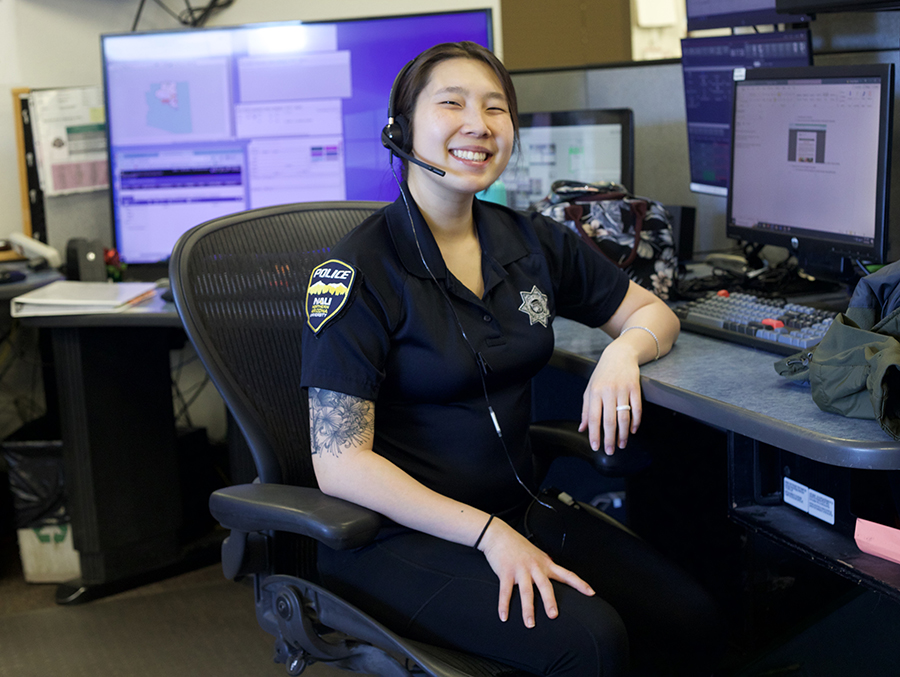National Public Safety Telecommunicators Week occurs during the second week of April and celebrates these behind-the-scenes workers. Around 240 million 9-1-1 calls are made each year, and this week recognizes those who play the crucial role of answering and responding to them.
Senior NAUPD dispatcher Jennifer Hood’s main responsibility is to answer emergency phone calls and dispatch the proper response. She also answers community questions and carries out administrative duties for the department.
She describes her office as a “catch-all” for any question students have, as most callers are in a transitional stage of life and just entering independence.
“Our role as dispatchers is critical and difficult,” Hood said. “Normally, as we run with just one person in here. We’re handling everything: All the radio traffic, all the phone calls, all the walk-ins, all the alarms going off, everything that’s happening at the same time, one person is dealing with.”
Hood works 12-hour shifts from 7 a.m. to 7 p.m. She typically starts her day by checking the police blotter and catching up on any activity that occurred when she was off duty.
She spends the rest of her shift answering calls, keeping track of fire alarm tests and assisting student workers with traffic control.

However, not every day is typical. Hood said an incident that stood out to her was when a student’s father suffered cardiac arrest during move-in weekend.
Paramedics arrived and took the man to the hospital within minutes because of Hood’s coordination in dispatching.
“The sense of purpose, the sense of knowing exactly what I needed to do for this person to give them the best shot at surviving, you just snap into a different focus and you’re like this is it, okay, and you perform at your best when life is at stake,” Hood said. “Knowing that when life is on the line, we are here—I am here— and we make a huge difference is what matters to me and is why I do this.”
Before becoming a dispatcher, Hood was a National Park Service ranger. She said she transitioned into her NAUPD position easily because of her previous experience handling emergencies. Her role as a ranger gave her the training and knowledge necessary for communicating with first responders.
On calls, Hood said dispatchers ask questions abruptly, which sometimes causes students to think they are not being listened to. She explained that she does listen to callers, but it is essential for her job to gain all necessary information about a situation as quickly as possible.
“We are trying to be professional, efficient, timely and caring and carry out our job in the highest exceptional capacity for them,” Hood said. “It’s in those times of intense stress and trauma that your brain just kind of focuses on certain things and maybe people can’t say exactly what’s going on, so we launch into questions to figure out what we need to know.”
Jhordyn Bigelow initially joined NAUPD as a student worker, then transitioned to a full-time dispatcher position after graduating.
When Bigelow was a freshman, she frequently used NAUPD’s Safe Walk program to request an escort across sides of campus. She said she applied for a role with NAUPD partially because of this service, and the safety it provides.
“When I applied for this job and I actually started working, I was like, ‘Wow, I didn’t know how much they did,’” Bigelow said.
Bigelow described an instance in which a student’s parent called for help acquiring an enrollment verification form. While it was not her responsibility, she assisted them anyway because she remembered struggling with the same task as a student.
“I think what students should know is that we’re always there for them,” Bigelow said. “We’re always here, 24/7. It’s our job. Don’t feel embarrassed to call us.”
The NAUPD non-emergency line is (928) 523-3611 and their email is askNAUPD@nau.edu. Other services can be found NAUPD’s website. In any emergency, call 911.
Chloe Legay | NAU Communications




